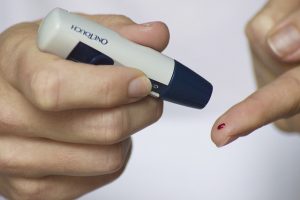Supplementation with selenium and vitamin D can improve the prognosis of type 2 diabetes mellitus and Hashimoto’s thyroiditis. Adding a daily dose of selenium and vitamin D to conventional diabetes medication can give significant health benefits [Yu 2024].

Researchers at Hunan University of Chinese Medicine, Hunan Province, China, recommend 100-200 mcg/day of selenium and 100 mcg/day of vitamin D for three to six months for patients with Hashimoto’s thyroiditis and especially for Hashimoto’s thyroiditis patients with concomitant type 2 diabetes [Yu 2024].
A 2024 study by Feng et al has shown that adding 200 mcg of selenium daily and 100 mcg of vitamin D to standard anti-diabetic drugs significantly improved thyroid function, thyroid antibodies, blood glucose, and blood lipids in type 2 diabetes patients who were also diagnosed with Hashimoto’s thyroiditis.
Optimal Dosage of Vitamin D
The optimal dosage of vitamin D supplementation for Hashimoto’s thyroiditis patients has not been conclusively established. Yu et al cite various studies using dosages of vitamin D that range from 25 mcg/day to 175 mcg/day. All of the studies show that vitamin D supplementation is beneficial for patients with Hashimoto’s thyroiditis [Yu 2024].
The value of the Feng study is that it shows a good outcome with 100 mcg/day of vitamin D. The relatively high daily dosage of 100 mcg was associated with improved glucose and lipid metabolism as well as with improved thyroid function indices [Feng 2024].
Optimal Dosage of Selenium
Note that the selenium used in the Feng study was selenium from a selenium-enriched yeast preparation, not a pure selenomethionine product and not an inorganic sodium selenite product [Feng 2024].
Yu et al cite a 2024 meta-analysis of randomized controlled trials. The meta-analysis shows that selenium supplementation with 100 mcg/day reduced TSH hormone levels and TPOAb antibody levels in Hashimoto’s thyroiditis patients [Huwiler 2024].
Larsen et al suggest that serum selenium concentrations should be in the range 120-130 mcg/L. To achieve this level, they say, requires a daily selenium intake of at least 100 mcg per day [Larsen 2024].
Conclusion: Possible Synergy of Vitamin D and Selenium
Type 2 diabetes and thyroiditis often occur in combination. They both cause considerable damage to the body. There is no clear treatment for type-2 diabetes mellitus patients with Hashimoto’s thyroiditis. Combining diabetes drug treatment with adjuvant selenium and vitamin D supplementation may improve thyroid function as well as blood glucose and lipid levels [Feng 2024].
There may well be a synergistic effect between vitamin D and selenium for type 2 diabetes patients with Hashimoto’s thyroiditis. However, the extent of the synergy and the biological mechanisms explaining the synergy are unclear and need further investigation [Yu 2024].
There is some evidence that selenium enhances the therapeutic effects of vitamin D in Hashimoto’s thyroiditis. Moreover, vitamin D supplementation may promote selenium absorption. However, it is not known if vitamin D enhances the efficacy of selenium in the treatment of Hashimoto’s thyroiditis [Yu 2024].
Sources
Feng F, Zhou B, Zhou CL, Huang P. Vitamin D, selenium, and antidiabetic drugs in the treatment of type 2 diabetes mellitus with Hashimoto’s thyroiditis. World J Diabetes. 2024;15:209-219.
Huwiler VV, Maissen-Abgottspon S, Stanga Z, Mühlebach S, Trepp R, Bally L, Bano A. Selenium supplementation in patients with
Hashimoto Thyroiditis: a systematic review and meta-analysis of randomized clinical trials. Thyroid 2024; 34: 295-313.
Larsen C, Winther KH, Cramon PK, Rasmussen ÅK, Feldt-Rasmusssen U, Knudsen NJ, Bjorner JB, Schomburg L, Demircan K, Chillon TS, Gram J, Hansen SG, Brandt F, Nygaard B, Watt T, Hegedus L, Bonnema SJ. Selenium supplementation and placebo are equally effective in improving quality of life in patients with hypothyroidism. Eur Thyroid J. 2024 Jan 1;13(1):e230175.
Yu YF, Shangguan XL, Tan DN, Qin LN. Vitamin D and selenium for type 2 diabetes mellitus with Hashimoto’s thyroiditis: Dosage and duration. World J Diabetes. 2024;15:1824-1828.
The information presented in this review article is not intended as medical advice. It should not be used as such.
